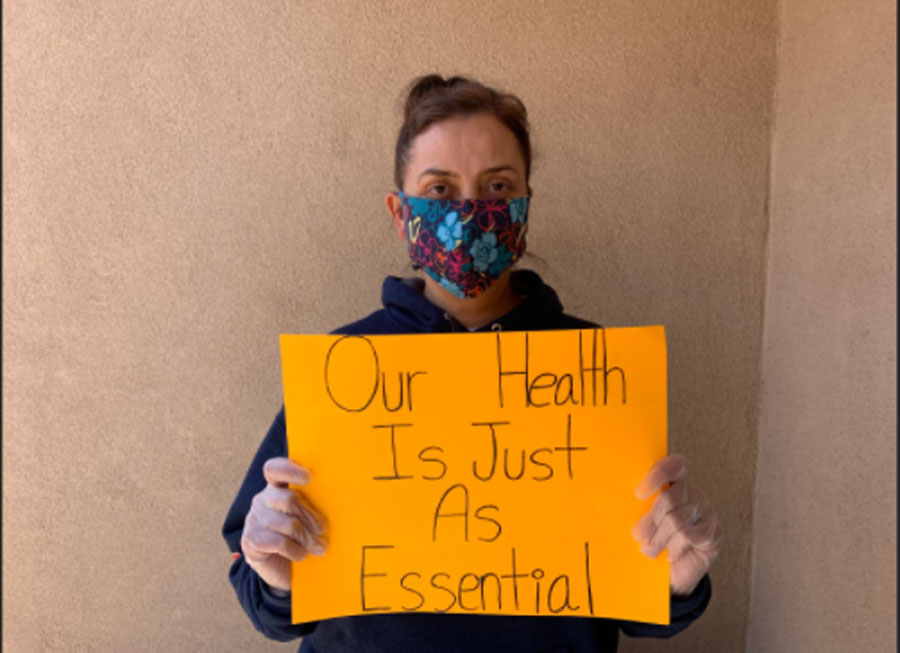Essential Workers Strike For Protection Against Covid-19
April 28, 2020
Across the nation, essential workers have been organizing strikes and other actions, hoping their demands will be met by their employers to help protect them against Covid-19.
Essential workers, such as doctors and nurses, grocery store employees, delivery drivers and mail carriers, fast food workers, transit employees, etc., are on the front lines of Covid-19 working to protect and provide for their communities. These workers are risking their lives going to work every day, and many feel they are not being protected by their employers. There are many worker actions happening in the United States across different types of jobs, all demanding change.
According to Business Insider, three hundred Amazon employees pledged to United for Respect, a worker’s rights group, to call in sick on April 21. This demonstration had workers from 50 warehouses across the nation take part in this strike. It is one of many worker actions that have taken place since early March.
The first organized strike took place on March 30 at an Amazon warehouse on Staten Island, according to USA Today. This strike was organized by Chris Smalls, a management assistant, who was later fired. According to demonstrators, there were about 50 participants, but Amazon said that there were only 15. On the same day, Instacart had as many as 150,000 workers strike across the nation as well.
Another Amazon warehouse walkout took place on April 1 in Detroit.
The CEO of Amazon has claimed that Amazon is protecting their workers, but employees believe otherwise.
The demands for the recent Amazon strikes, according to Forbes, are facility shutdowns where there are infected workers, testing and full pay to employees at closed facilities, paid sick leave for those who have symptoms but have not yet tested positive, increased hazard pay, and the elimination of work quotas to provide employees time to sanitize and wash their hands frequently.
Amazon’s employee demands are similar to those at other businesses, including Whole Food, Instacart, and Trader Joe’s. Grocery store employees are especially at risk of becoming infected with Covid-19 because of little to no protective gear, close encounters with other employees and customers, and in some cases having no health care or paid sick leave.
On March 31, some Whole Foods workers called in sick in protest, according to The Washington Post. Whole Foods employees also created a petition to voice their needs; the petition had over 9,700 signatures at the beginning of the month, according to CNBC. In addition to this, Trader Joe’s employees started a petition that had over 20,000 signatures as of the beginning of April.
To adequately protect their employees, some stores are enforcing new protocols to protect employees and customers. This includes reduced stores hours to clean and sanitize, special hours for seniors and vulnerable customers, hand washing/hand sanitizing breaks, plexiglass screens between customers and employees at cash registers, and floor markings to remind customers to social-distance and stay six feet apart from each other, according to CNBC.
Walmart has added extra precautions, which include providing masks and gloves for all of its employees and temperature checks before shifts. They have also offered bonuses of $300 to full-time employees and $150 to part-time employees, according to the United Food & Commercial Workers Union.
Amazon, Whole Foods, and Instacart are also providing raises and additional benefits for their employees.
Fast food employees are also calling for change. These employees are being paid less than $15 an hour, according to ABC News, to risk their lives to provide food for communities. One movement, Fight for $15, is advocating for pay raises and is supporting worker strikes for fast food employees.
McDonald’s is one of the fast food chains that has seen online organized strikes recently after some employees tested positive in their restaurants. In response to the pandemic, McDonald’s has added protective equipment and barrier shields to some restaurants, according to ABC News.
Transit workers are also being hit hard by this pandemic and have seen many employees fall ill and some die from Covid-19. In response to the rising number of infected employees and deaths, two transit unions have joined together to form an ultimatum: Protection from transit agencies or transit employees will essentially “take a break,” according to The Nation. A moment of silence was taken on March 27 after the first transit worker died.
The transit unions are demanding precautions similar to other essential workers. Will these demands be met for all essential workers now or will more infections and deaths occur?


